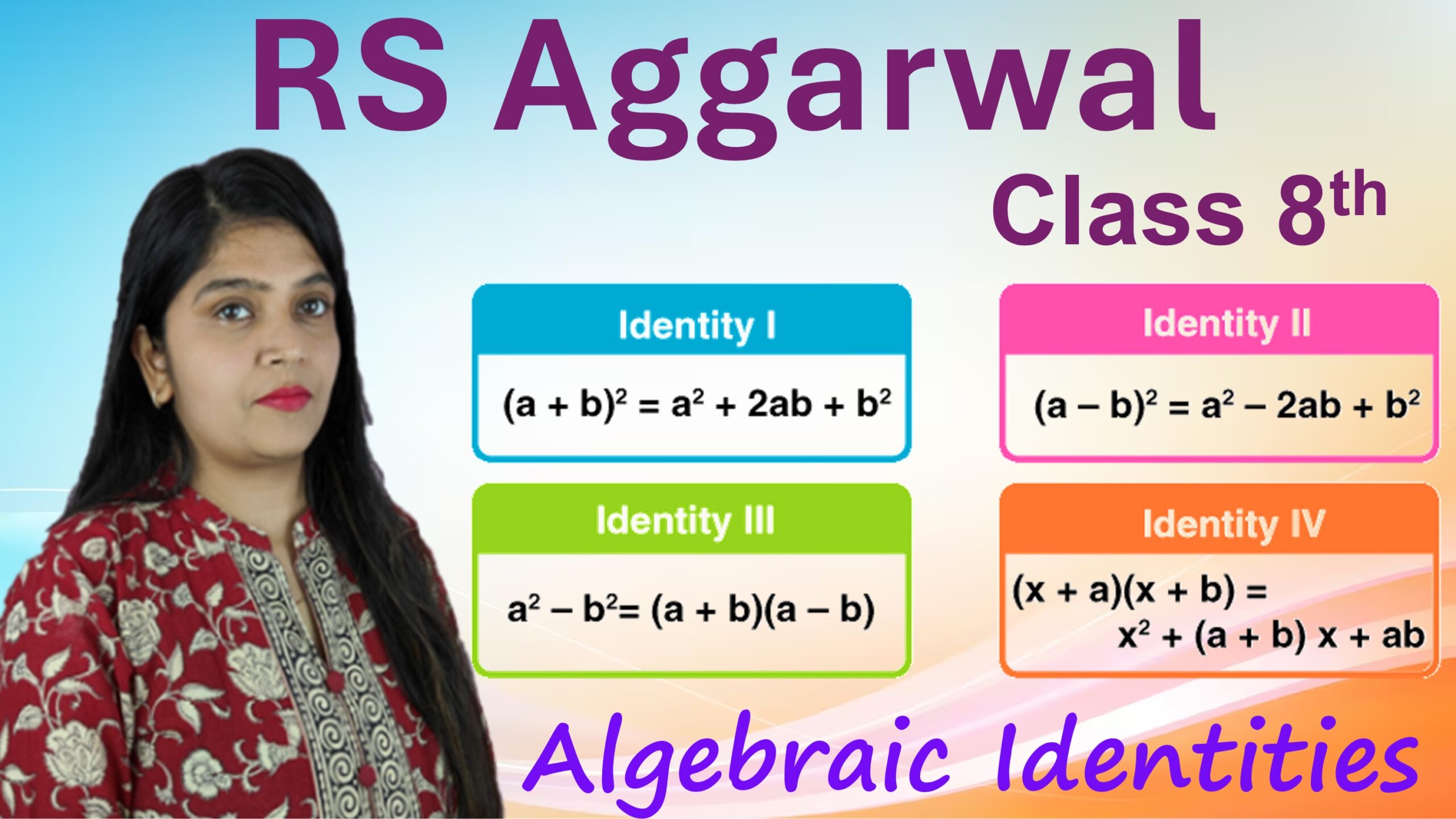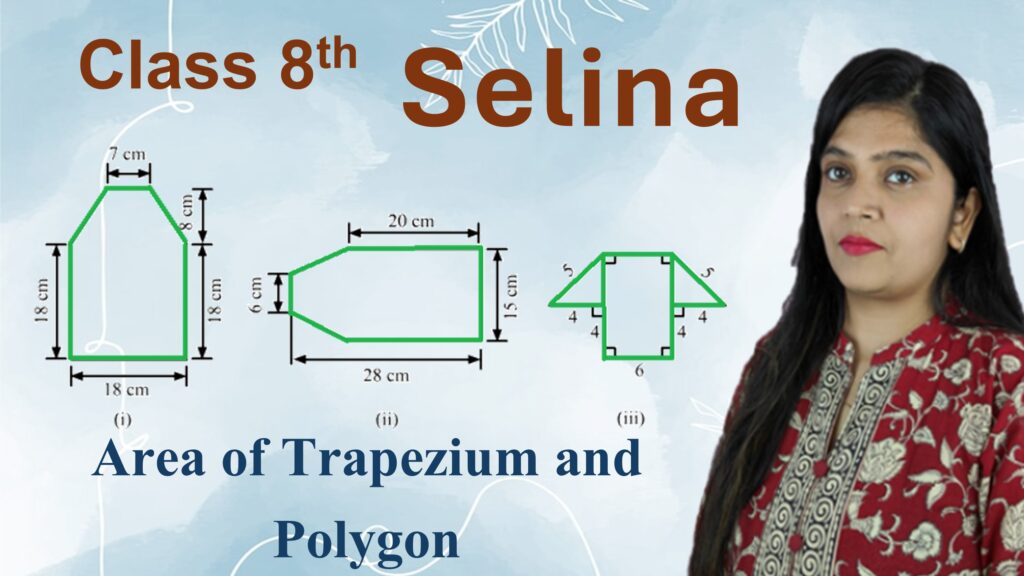Exercise: 13-D
Multiple Choice Questions
Q1: If \(\left(x+\frac{1}{x}\right)=3\), then \(\left(x^2+\frac{1}{x^2}\right)\) is equal to:
Step 1: Recall the identity:
\[
\left(x+\frac{1}{x}\right)^2 = x^2 + \frac{1}{x^2} + 2
\]Step 2: Rearrange to find \(x^2 + \frac{1}{x^2}\):
\[
x^2 + \frac{1}{x^2} = \left(x+\frac{1}{x}\right)^2 – 2
\]Step 3: Substitute the given value \(x+\frac{1}{x}=3\):
\[
x^2 + \frac{1}{x^2} = 3^2 – 2 \\
x^2 + \frac{1}{x^2} = 9 – 2 \\
x^2 + \frac{1}{x^2} = 7
\]Answer: c. 7
Q2: If \(\left(x+\frac{1}{x}\right)=4\), then \(\left(x^4+\frac{1}{x^4}\right)\) is equal to:
Step 1: Recall the identities:
\[
\left(x+\frac{1}{x}\right)^2 = x^2 + \frac{1}{x^2} + 2 \\
\left(x^2+\frac{1}{x^2}\right)^2 = x^4 + \frac{1}{x^4} + 2
\]Step 2: Find \(x^2 + \frac{1}{x^2}\) first:
\[
x^2 + \frac{1}{x^2} = \left(x+\frac{1}{x}\right)^2 – 2 \\
x^2 + \frac{1}{x^2} = 4^2 – 2 \\
x^2 + \frac{1}{x^2} = 16 – 2 = 14
\]Step 3: Now, find \(x^4 + \frac{1}{x^4}\):
\[
x^4 + \frac{1}{x^4} = \left(x^2 + \frac{1}{x^2}\right)^2 – 2 \\
x^4 + \frac{1}{x^4} = 14^2 – 2 \\
x^4 + \frac{1}{x^4} = 196 – 2 = 194
\]Answer: c. 194
Q3: If \(\left(x^2+\frac{1}{x^2}\right)=102\), then the value of \(\left(x-\frac{1}{x}\right)\) is:
Step 1: Recall the identity:
\[
\left(x-\frac{1}{x}\right)^2 = x^2 – \frac{1}{x^2} + 2
\]Step 2: Substitute \(x^2 + \frac{1}{x^2} = 102\):
\[
\left(x-\frac{1}{x}\right)^2 = 102 – 2 \\
\left(x-\frac{1}{x}\right)^2 = 100
\]Step 3: Take square root:
\[
x – \frac{1}{x} = \sqrt{100} = 10
\]Answer: b. 10
Q4: If \(x+y=7\) and \(xy=12\), the value of \(\left(x^2+y^2\right)\) is:
Step 1: Recall the identity:
\[
(x+y)^2 = x^2 + y^2 + 2xy
\]Step 2: Rearrange to find \(x^2 + y^2\):
\[
x^2 + y^2 = (x+y)^2 – 2xy
\]Step 3: Substitute the given values \(x+y = 7\) and \(xy = 12\):
\[
x^2 + y^2 = 7^2 – 2(12) \\
x^2 + y^2 = 49 – 24 \\
x^2 + y^2 = 25
\]Answer: a. 25
Q5: \(107\times93=?\)
Using the identity \((a+b)(a-b) = a^2 – b^2\)
Step 1: Identify the numbers around a convenient base (here 100):
\[
107 = 100 + 7, \quad 93 = 100 – 7
\]Step 2: Apply the identity \((a+b)(a-b) = a^2 – b^2\):
\[
107 \times 93 = (100 + 7)(100 – 7) = 100^2 – 7^2
\]Step 3: Calculate the squares:
\[
100^2 – 7^2 = 10000 – 49
\]Step 4: Subtract:
\[
10000 – 49 = 9951
\]Answer: b. 9951
Q6: \(\left(370\right)^2-\left(369\right)^2=?\)
Using the identity \((a^2 – b^2) = (a-b)(a+b)\)
Step 1: Identify \(a\) and \(b\):
\[
a = 370, \quad b = 369
\]Step 2: Apply the identity:
\[
370^2 – 369^2 = (370 – 369)(370 + 369)
\]Step 3: Calculate each term:
\[
370 – 369 = 1 \\
370 + 369 = 739
\]Step 4: Multiply:
\[
(370^2 – 369^2) = 1 \times 739 = 739
\]Answer: c. 739
Q7: If \(\left(a-b\right)=7\) and \(ab=9\), then \((a^2+b^2=?\)
Step 1: Recall the identity:
\[
(a-b)^2 = a^2 + b^2 – 2ab
\]Step 2: Rearrange to find \(a^2 + b^2\):
\[
a^2 + b^2 = (a-b)^2 + 2ab
\]Step 3: Substitute the given values \((a-b)=7\) and \(ab=9\):
\[
a^2 + b^2 = 7^2 + 2(9) \\
a^2 + b^2 = 49 + 18 \\
a^2 + b^2 = 67
\]Answer: a. 67
Q8: What must be added to \(\left(4x^2+20x+16\right)\) so that it becomes a perfect square?
i. Using the identity \((a+b)^2 = a^2 + 2ab + b^2\)
Step 1: Compare the given expression with the identity:
\[
4x^2 + 20x + 16
\]
Here, \(4x^2 = (2x)^2\) and \(20x = 2 \cdot 2x \cdot ?\) (we need \(b\))
Step 2: Let the perfect square be \((2x + b)^2 = (2x)^2 + 2\cdot2x\cdot b + b^2\)\[
2 \cdot 2x \cdot b = 20x \Rightarrow 4b = 20 \Rightarrow b = 5
\]Step 3: Calculate \(b^2\):
\[
b^2 = 5^2 = 25
\]Step 4: The expression currently has constant term 16. To make it a perfect square, we need \(b^2 = 25\).
Step 5: Therefore, the number to add:
\[
25 – 16 = 9
\]Answer: a. 9
Q9: If \(\left(x-\frac{1}{x}\right)=3\), then \(\left(x^2+\frac{1}{x^2}\right)\) is equal to
Step 1: Use the identity:
\((x – \frac{1}{x})^2 = x^2 – 2 + \frac{1}{x^2}\)
Step 2: Substitute the given value:
\((x – \frac{1}{x})^2 = 3^2 = 9\)
Step 3: Expand the identity:
\((x – \frac{1}{x})^2 = x^2 – 2 + \frac{1}{x^2} = 9\)
Step 4: Solve for \(x^2 + \frac{1}{x^2}\):
\(x^2 + \frac{1}{x^2} = 9 + 2 = 11\)
Answer: c. 11
Q10: Which of the following is not equal to \(\left(a^2+b^2\right)\)?
Step 1: Recall the identities:
\((a+b)^2 = a^2 + 2ab + b^2\)
\((a-b)^2 = a^2 – 2ab + b^2\)
Step 2: Check each option:
Option a: \((a+b)^2 – 2ab = a^2 + 2ab + b^2 – 2ab = a^2 + b^2\) ✅
Option b: \((a-b)^2 + 2ab = a^2 – 2ab + b^2 + 2ab = a^2 + b^2\) ✅
Option c: \(\frac{1}{2} \{(a+b)^2 – (a-b)^2\} = \frac{1}{2} \{(a^2 + 2ab + b^2) – (a^2 – 2ab + b^2)\} = \frac{1}{2} (4ab) = 2ab\) ❌
Option d: \(\frac{1}{2} \{(a+b)^2 + (a-b)^2\} = \frac{1}{2} \{(a^2 + 2ab + b^2) + (a^2 – 2ab + b^2)\} = \frac{1}{2} (2a^2 + 2b^2) = a^2 + b^2\) ✅
Answer: c. \(\frac{1}{2}\left\{{(a+b)}^2-\left(a-b\right)^2\right\}\)
Q11: \(\left(x+\frac{1}{x}\right)^2-\left(x-\frac{1}{x}\right)^2=?\)
Step 1: Recall the identities:
\((x+\frac{1}{x})^2 = x^2 + 2 + \frac{1}{x^2}\)
\((x-\frac{1}{x})^2 = x^2 – 2 + \frac{1}{x^2}\)
Step 2: Subtract the two expressions:
\((x+\frac{1}{x})^2 – (x-\frac{1}{x})^2 = (x^2 + 2 + \frac{1}{x^2}) – (x^2 – 2 + \frac{1}{x^2})\)
Step 3: Simplify:
\((x+\frac{1}{x})^2 – (x-\frac{1}{x})^2 = 2 + 2 = 4\)
Answer: b. 4
Q12: If \(\left(x+\frac{1}{x}\right)=\frac{17}{4}\), then the value of \(\left(x-\frac{1}{x}\right)\) is:
Step 1: Use the identity:
\((x+\frac{1}{x})^2 – (x-\frac{1}{x})^2 = 4\)
Step 2: Let \((x-\frac{1}{x}) = y\). Then:
\((x+\frac{1}{x})^2 – y^2 = 4\)
Step 3: Substitute \(x+\frac{1}{x} = \frac{17}{4}\):
\(\left(\frac{17}{4}\right)^2 – y^2 = 4\)
Step 4: Calculate \((\frac{17}{4})^2\):
\(\frac{289}{16} – y^2 = 4\)
Step 5: Convert 4 into 16ths:
\(\frac{289}{16} – y^2 = \frac{64}{16}\)
Step 6: Solve for \(y^2\):
\(y^2 = \frac{289}{16} – \frac{64}{16} = \frac{225}{16}\)
Step 7: Take square root:
\(y = \sqrt{\frac{225}{16}} = \frac{15}{4}\)
Answer: d. \(\frac{15}{4}\)






Leave a Comment